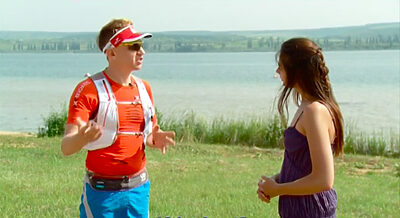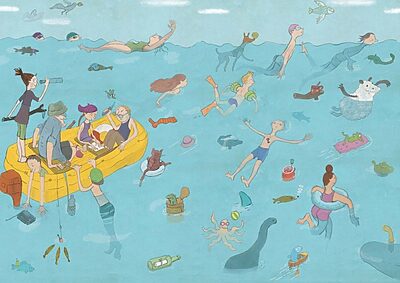Mission: athletes run around 26 islands and swim around them. Total distance: 75 km. Open water swim: 10 km. Run: 65 km.
So far, only two Moldovans have entered the ÖTILLÖ Swimrun World Championship. Dmitri Voloshin and Liviu Croitoru are the crazy guys who will go down in the history of Moldovan sport.
Liviu Turcanu : I first heard about ÖTILLÖ from a magazine, where 80 of the toughest competitions on the planet were featured. I overlooked it, I thought it was crazy, it had nothing to do with reality. Then Dima saw it, I saw it again, and after he did Ironman, I did Triathlon, we thought we need to see something bigger, to see what our potential is.
Дмитрий Волошин: What does “our potential” mean if you haven’t done Otillo? Just know that CNN calls it “one of the toughest endurance races in the world. It presumes cold water, running, swimming. You run 40 miles, swim 10. What Ironman doesn’t want to beat the Otillo? Everybody wants that. That’s why Liviu and I thought about it and decided to take part in this competition because we felt we were ready enough for the challenge. We sent them an application, saying that we are so and so and so. This is the Moldovan running champion, I did Ironman, I ran an ultramarathon. They looked at it and said, “Moldova is a new country to our race, come and join us!” On 5 September we left for Sweden.
Liviu Țurcanu: As soon as we left the airport, it was 16 degrees outside, in Chisinau it was 31 degrees. I ran the first training run in the evening and when I touched the water with a finger, the next day I was in no mood because I had to get into this water.
Дмитрий Волошин: September 5, 6 am, 120 pairs. Only pairs participate in Otillo. Two people are tied with a rope so they don’t get lost, don’t drown and so you can bring the “corpse”, lest it gets lost in the Baltic Sea. We were running, everyone rushed to the water, in the first leg we had to swim 1700 meters the longest swimming distance. The whole crowd goes that way, we go that way too. Such a pain, the vessels get thinner from the cold, after running, after being hot. Consciousness disconnects, goggles sweat, huge waves, all over people. Shock. When I come to, about 5 minutes later, I realise that everyone has gone, and we’re swimming in a slightly wrong direction. To make it clear, we were supposed to reach a lighthouse, which we saw as a broken pixel on a full HD TV. That’s how big the lighthouse was that we could see in the distance, which is why we got lost.
Liviu Țurcanu: Apart from the fact that we swam 200 meters, we ran on some rocks, there was no trail, asphalt, there were rocks. I fell down, Dima was sick, me too. Our brains weren’t thinking, we thought that was it, that was the end of our competition. That’s after a 1 km 200 run and 1900 swim. At 3 1/2 km, we were practically ready to stop.
Liviu Țurcanu: We tied ourselves with the rope and we left again. After that we thought we’d try it without the rope, we untied and ended up in totally different places. The organisers told us not to untie, that we would end up in different places and we would not be able to find each other. After that, slowly, slowly, at the first food station we ate, drank and already recovered. But anyway, after a 3 km run again cold water. That took about 4-5 stages of cold water/dry water exchange until the body already got used to it.
Дмитрий Волошин: In short I run, run, run, I remember: why did the Russians feed me butter yesterday? I had met a couple from Russia who told us that we really had to eat half a packet of butter before the competition to keep warm. They still ate, they still ate, that at first I thought they were joking, I told them to eat them first. Liviu ate and then I thought “what, I’m worse?”. We also had a big breakfast in the morning. Well, that was it, I was sick, nauseous, but I didn’t want to leave the “golden” calories there. They gave us food once every 10 km and I thought “well, I’m going to leave these calories here and then what am I going to have energy from? But I understood that I couldn’t run any further, “wait, I have a job here”. I threw up. I recovered, the butter came out of me along with my breakfast. It was easier, it was fine. I ran on, to the next gas station. The most difficult part was neither the cold nor the obstacles in the water, but the fact that we were eating against the clock. There were 6 stations there, which closed after a certain time. If you didn’t make it by the time they closed, you were out of the competition. That was very hard for us, we only had 10-15 minutes. Five teams didn’t make it, didn’t enter. They were eliminated. At one of the stations, at 16:00, we basically reached the closing. Whoever doesn’t make it, goes to the finish on the boat.
Liviu Țurcanu: The last 50 meters of the swim, we already saw the dry. I couldn’t believe my eyes that this was the end and I was asking “Is this Otillo?” “Yes, it’s Otillo.” And that’s it, it’s the end.
Audio: The Otillo Championship is suicide if you don’t prepare thoroughly. You have to do sports for at least four years, businessman Dmitry Voloshin’s experience shows. Otillo means doing the maths, because you have to calculate distances, quantities of food, so you can keep going from one station to another. Our team of Moldovans has marked everything on these pieces, which help with swimming.
Дмитрий Волошин: See. Start. Run, swim, run, swim. When you’re out there, it’s really hard to get your bearings. You don’t know what’s waiting for you in five minutes, long or short stage. Here you run, and at the end you have 75 km, you’re happy.
The guys marked data about the energy gained, the food served. When you perform in tough conditions like Otillo, you forget everything. Your brain, as you’ve heard, actually freezes when you swim in cold water after running. In other words, you kind of lose it.
Дмитрий Волошин: We were smart before the start. We planned that we would run about this distance, in this tempo, we would reach the finish at about this time. It was impossible to run there. There you had to climb like a climber. The speed was very slow. You move like a granny in bad weather, on ice. Very slowly. After we climbed the rocks, we ran up the paths. But even those go up, down, up, down. The asphalt is missing. I fell down, one of the swimming aids breaks, with it broken you can’t swim. Without it, you’ve got the speed of a turtle. You’re swimming in your boots, and your boots slow you down. You swim very slowly, and behind you is Liviu pulling you by the rope and telling you that you’re swimming the wrong way, the direction is wrong. I look at my hand, it’s swollen. Either because of the cold or dehydration. When I look at the picture at the end, I seem to smile, but my face is so swollen. I was joking that I puffed up with pride. But seriously, getting to the Otillo finish is not easy. If they gave us 20 hours, any moderately trained athlete could successfully complete the race. But it’s a 14-hour limit, and not in vain. That’s 15 minutes enough for us to finish. For us it was a great honor to participate in the world championship, as representatives of the Republic of Moldova and we were able to overcome 5 other teams from USA, Europe, Italy. For us it is an honour and for Moldovan sport as well. We hope that next year other athletes from us will go and we will record better results.
Liviu Țurcanu: For 3 km, about 16 minutes, we ended up at a bath, I wanted something warm to drink and I said that for a year I will not eat anything sweet and I will not bathe in the sea. We swam 12 km instead of 10 km and at the end when we arrived everyone congratulated us because we are Moldova, the country that for the first time participated in this competition. And we are the first ones who thought of this idea. Maybe others will still try after us. We want to motivate them to do sports, multiple sports, not just running or… The most interesting in training is the combination.
So whatever race you want to do, don’t limit yourself to one kind of sport. Swim, run, cycle, do sport in nature, be part of it. Get energised, get strong! Every sporting experience develops the muscles and skills you need not only in competition but also in life. Otillo, for example, as far as I understand it, is about trusting your partner, courage, ambition, perseverance, passion, patience and the insane lust for life with all your being.

